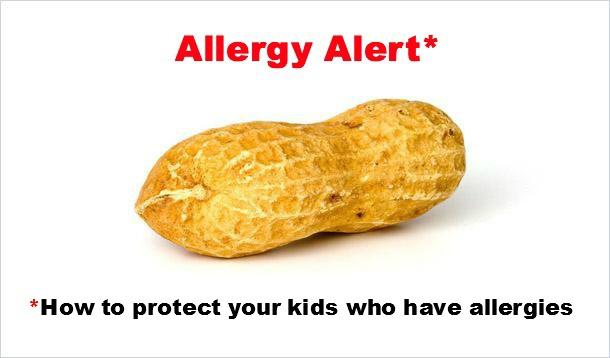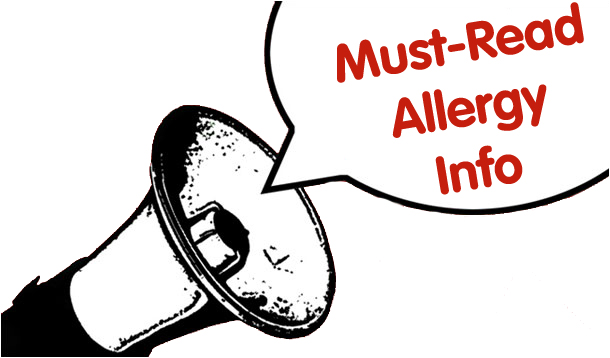
When your child is diagnosed with a severe allergy (like a severe allergy to bee stings, for example, or peanuts) it can be terrifying. The only way to cope with that fear is by arming yourself with knowledge. Here are five commonly asked questions about serious allergies in kids.
If you’ve had little to no experience with anaphylactic reactions, it can be scary to know what to look for. The truth is, it can happen fast and deteriorate quickly (possibly turning life-threatening in a matter of minutes). So it’s important to have a clear idea in your mind of the typical symptoms anaphylaxis causes, which include:
The onset of symptoms, after exposure to the allergy trigger, can take mere minutes…or they can occur several hours later. In some cases (about 20% of the time) there can be a second phase of reaction that flares after the initial reaction has subsided. This can happen one to eight hours later, but it can occur up to 38 hours later.
Sending a kid with severe allergies to school can be nerve-wracking, to say the least. But with some advanced planning, there’s no reason you can’t send your child to school, confident that they will be safe. Here's your action plan:
It’s important to start talking to your child about their allergy right away. There’s no benefit to withholding this information. They may not, of course, fully understand until they're a little older, but they will be able to grasp some of the key concepts. Your child should understand the seriousness of the allergy, the triggers and situations they should avoid, and how they can explain the allergy to classmates. You should also talk to them about recognizing the symptoms of a severe allergic reaction. In particular, it’s important that your child knows they should not trade or share food, utensils, or food containers. They should also wash their hands before and after eating, and put their food on a personal placemat or napkin.
Kids who are mature enough (usually around age 6 or 7) should have their own epinephrine auto-injector, like EpiPen, on them at all times. Younger kids will need to have a member of school staff carry an EpiPen, or have one available in the classroom.
Have an emergency plan already prepared (see above) and have emergency numbers and contacts readily available.
It’s crucial that you always have a ready-to-use EpiPen on hand. But you need to know that EpiPen Auto-Injectors expire. In our busy lives, it's easy to lose track of a small detail like an expiration date. So here’s a simple way to take care of this: register for the Expiration Reminder Service at EpiPen.ca.
It’s a common question, and a common fear—how will I know FOR SURE whether I should use my child’s EpiPen? And the short answer is: you don’t have to be sure. The very first signs of a severe allergic emergency can be difficult to interpret. But hesitating to use an EpiPen can be life-threatening. Seconds count, when it comes to severe allergic and anaphylactic reactions. Even if it turns out your child wasn't having an allergic reaction, it's better to have used an EpiPen in this situation than to have not used an EpiPen in a real emergency. A good rule of thumb: if you're even considering using it, that means you should go ahead and use it.
Severe allergies in a kid are a serious matter—but fear of a reaction shouldn't cause a kid to miss out on the wonderful experiences of childhood like school and playdates with friends. There are many strategies to prevent exposure, effective ways to deal with a reaction should one occur, and plenty of support and information.
 Severe allergies are on the rise in Canada.
Severe allergies are on the rise in Canada.
This is proudly sponsored by EpiPen®.
EpiPen.ca
The opinions expressed in this post are the opinions of the individual author and may not reflect the opinions of Pfizer Canada, the Canadian distributor of EpiPen. Pfizer Canada reviews all material to ensure medical accuracy of statements.
EpiPen® and EpiPen® Jr (epinephrine) Auto-Injectors are indicated for the emergency treatment of anaphylactic reactions in patients who are determined to be at increased risk for anaphylaxis, including individuals with a history of anaphylactic reactions. Selection of the appropriate dosage strength is determined according to patient body weight.
EpiPen® and EpiPen® Jr Auto-Injectors are designed as emergency supportive therapy only. They are not a replacement for subsequent medical or hospital care. After administration, patients should seek medical attention immediately or go to the emergency room. For the next 48 hours, patients must stay within close proximity to a healthcare facility or where they can call 911. To ensure this product is right for you, always read and follow the label. Please consult the Consumer Information leaflet in your product package for complete dosage and administration instructions.
© 2013 Pfizer Canada Inc., Kirkland, Quebec H9J 2M5 • Toll free: 1-877-EPIPEN1 (1-877-374-7361)
EpiPen®, EpiPen® Jr are registered trademarks of Mylan Inc. licensed exclusively to its wholly-owned affiliate, Mylan Specialty, L.P.; sub-licensee, Pfizer Canada Inc., Kirkland, Quebec H9J 2M5